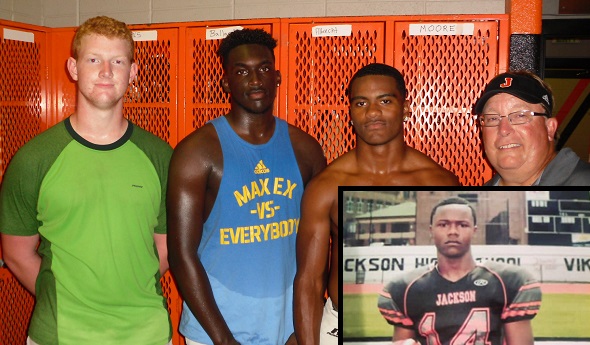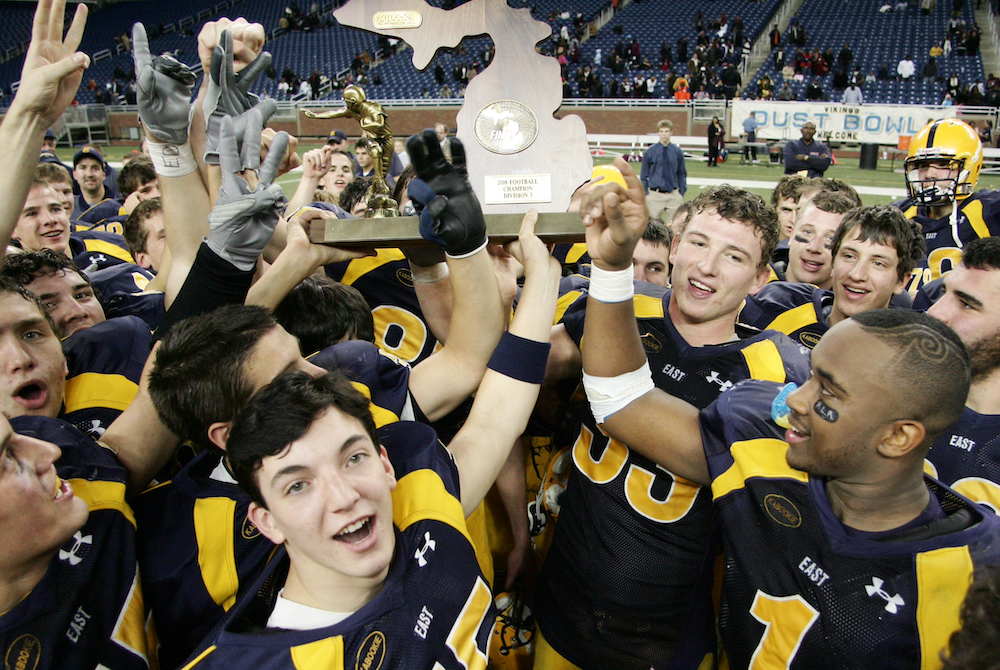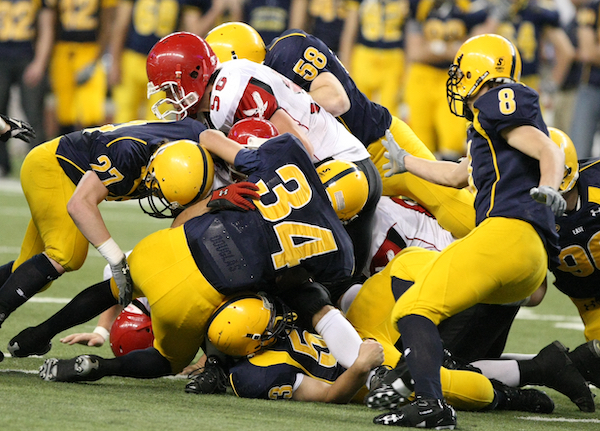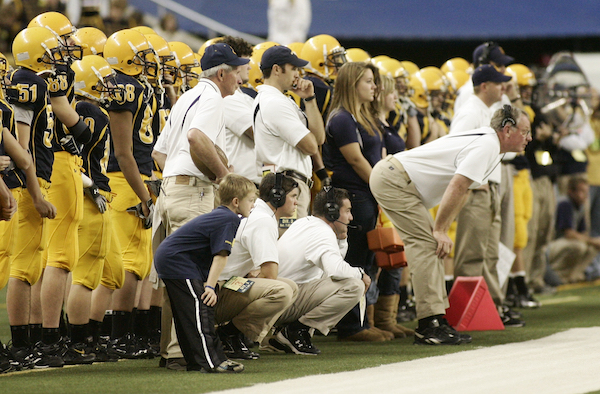
Honoring Lost Teammate, Jackson Rises
By
Chip Mundy
Special for Second Half
September 10, 2015
By Chip Mundy
Special for Second Half
JACKSON – Hollywood producers do not make movies about football teams just two games into a season.
But if they did, Jackson High School would be a good place to start.
 Take an urban football team that hasn’t made winning a habit in decades, mix in the recent addition of a successful coach from a nearby smaller rural school and throw in an eye-popping start this season, and you have a nice story. But there is more.
Take an urban football team that hasn’t made winning a habit in decades, mix in the recent addition of a successful coach from a nearby smaller rural school and throw in an eye-popping start this season, and you have a nice story. But there is more.
This also is a heart-wrenching – yet somehow uplifting – story of a bunch of teen-aged boys trying to move on a little more than three months after one of their teammates was killed in a triple-fatal automobile crash.
Meet the 2015 Jackson Vikings. Roll the film.
Dealing with adversity
It was the Sunday of Memorial Day weekend when everything changed. Jackson junior Maseo Moore, 16, was killed in a triple-fatal automobile accident on I-94 in Calhoun County. Also killed in the accident were former Jackson High School secretary Ella Blackwell, who had retired five years earlier, and her sister, Ethel Brinstone.
Moore, a wide receiver on the varsity in 2014, showed improvement late in the season and was in position to move up the depth chart for his senior year, according to Vikings head coach Scott Farley.
Moore’s death presented Farley with a challenge he had never faced during nearly 30 years of coaching.
“There is no session at coaching clinics that tells you how to deal with something like that,” Farley said. “We talked as a staff and kind of talked through what we wanted our reaction to be and how we could support the kids and each other at that point.
“I talked to my brother (Mike), who has been a head coach for years coaching down in Georgia, and he had kind of dealt with something similar, and I talked to a couple of other coaching colleagues to kind of pick their brain a little bit.”
The answer was simple but not so easy: Communication.
“We were just available to the kids,” Farley said. “We met with them in the library first hour and spent a couple of hours with them just talking about Maceo and what he would have wanted us to do going forward, and how we needed to support each other and love each other; basically, because we were all hurting.”
About 100 students, many of them football players, attended Moore’s funeral, and as the summer progressed, the players and coaching staff kept in touch with Moore’s family. A few decisions were made about the upcoming season: One, the team would dedicate its season – and in particular its opening game – to their friend and teammate, and two, running back Shonte’ Suddeth would inherit the No. 14 uniform that had been worn by Moore.
Not only did Suddeth have Moore’s number on the back of his uniform for the season opener, the name “Moore” was across the back instead of “Suddeth.”
“He was like a brother to me,” Suddeth said. “He was with me every day. I’d take him to get his hair cut and everything – everything he needed, I was there for him. Everybody noticed it, and we had a group meeting, and they said I should be the one to wear his number.”
With his emotions running high, Suddeth had an inkling of something special that might happen on opening night: He had talked with his uncle, who told him, “You have to score the first time you touch the ball.”
Just two and a half minutes into the game, Suddeth, on his first carry, raced 11 yards for a touchdown.
He dropped to one knee in the end zone and pointed toward the sky.
“I pointed up to the air to tell him, ‘This is for you,’” Suddeth said. “I think about him before every game.”
Suddeth finished with 110 yards rushing and three touchdowns on just eight carries as Jackson defeated Ann Arbor Huron 40-7. After the game, the entire team presented Moore’s mother with the game ball.
“I think the good Lord uses bad things and bad situations for good,” Farley said. “I think our kids have – where some of them could have gone in another direction because of their sadness and their depression over the loss of their friend – they have used it to become stronger as individuals and as a group, and that has been a positive.”
Moving forward
When you walk into the football locker room at Withington Community Stadium, the first locker on the right has tape with the name Moore on it. It looks like every other locker, but what it represents makes it special to the players and the coaching staff.
Moore’s presence always will be felt by the players, and the locker helps keep his memory fresh. But life and football games go on, certainly as Moore would have wanted. Jackson followed its opening-night win with an even more impressive 56-27 victory over Lansing Everett.
Tonight, Jackson travels to East Lansing in search of its first 3-0 start in football since 2003, the last time the Vikings also started 2-0 prior to this season.
Winning isn’t exactly a tradition in football at Jackson, where the Vikings have not won a conference championship since 1945. (Yes – 70 years!) But the first two games with a combined score of 96-34 offer a huge contrast from a year ago when the Vikings lost to Ann Arbor Huron and Lansing Everett over the first two games by a combined score of 57-12.
The players say the difference is experience and a better understanding of the system that was brought in by Farley, in his third season at Jackson after a long and successful run at Leslie.
“About halfway through last year, we started to get it,” Jackson senior offensive guard Nate Lavery said. “It took us longer than it could have. We came into the season knowing pretty much everything we needed to know – at least the basics.”
Lavery is one of several standouts for Jackson. He helps anchor a strong line while Suddeth, quarterback LaJuan Bramlett and Corey Pryor II offer game-breaking potential on every play. Bramlett scored five touchdowns in the victory over Lansing Everett, and Suddeth, Bramlett and Pryor each have rushed for more than 200 yards just two games into the season.
“We have more speed than normal this year,” Farley said with a grin before adding that the Vikings are much more than speed at the skill positions.
“Guys like Maurice White, who has caught one or maybe two passes up to this point, he’s such a great leader and such a steadying force on the entire team,” he said. “Nate Lavery was an all-conference guard last year and has just been outstanding in the first two games. Carl Albrecht and Mac Carroll on the offensive line have been outstanding seniors. Cain Flowers has had four interceptions in two games.”
Optimism about football isn’t something that has been common around Jackson very often. Since 1950, the Vikings have posted a record of 186-379-14 for a .333 winning percentage, and they won a total of four games from 2011-14.
Farley knows all about football programs in a tailspin. He faced a similar situation more than 20 years ago when he took over at Leslie.
The man in charge
When Farley was hired at Leslie in 1993, the Blackhawks had not had a winning record in 10 years. In fact, since finishing 10-1 in 1983, Leslie was 15-66 over the following nine seasons.
Not unlike Jackson, Farley took over a team in despair, and he said the similarities were striking.
“It was no different than when I took over at Leslie in 1993,” he said. “You have a program that has been down for a while; you’re going to have people who have bad attitudes. If they had winning attitudes, they’d be winning, so that was not a surprise. I anticipated that. I think some of the guys on my staff who have been here for a while were more discouraged about that than I was just from the standpoint of they had been here a while and they were frustrated by it. They kind of felt like it was different here than it is other places, and it’s not.
“The problems that we’ve had here are the same problems we had at Leslie 23 years ago.”
At Leslie, Farley achieved his first winning season in his second year, but it took until 2000 before the Blackhawks made it to the playoffs. When he left Leslie, about 15 miles north of Jackson, he had a record of 117-82, including 84-42 over his final 12 seasons with the Blackhawks.
In 2008, Leslie played for the MHSAA Division 6 championship, losing to Montague 41-20.
So, why would a coach leave such a successful program for one in so much turmoil?
“I think people looked at me and thought, ‘This guy is crazy. He had a good gig in Leslie, and he’s never going to be successful here,’” Farley said. “I could have rolled out of bed for the next 14 years doing the same job, but it was an easier decision because of the situation.
“I think this is what I’m built for. Part of my personal journey for taking the position was to kind of push myself outside of my comfort zone.”
In doing so, Farley has found himself using many of the same techniques he used when he took over the rebuilding job at Leslie.
“It’s the same thing,” he said. “It’s developing work ethic, and you develop work ethic by getting kids to buy into you more than what you are selling. Often, people don’t buy a car; they buy the guy they are getting the car from. It’s just getting them to believe that they want to be on your team.”
By all accounts, the 2015 Vikings want to be on Coach Farley’s team, and his handling of the Maceo Moore tragedy was just another reason for the players to put their trust in their coach.
“It showed he was really there for us,” Suddeth said. “It lit a match, and we were going from there.”
Farley has a keen perspective on the attitudes of today’s youth, one that might have helped him connect with his players.
“People talk all the time about how kids are different today, and kids are different,” he said. “I’ve been coaching for 28 years total, 23 as a head coach, and kids are different, but it’s not a bad different. In society in general, people don’t trust each other, and there is so much dishonesty that goes on out there that there is a reason to be distrustful.
“Kids get burned enough times, and they get to the point where they don’t trust people. They need to know who you are and what you’re about and what you stand for before they are going to buy into whatever you are selling.”
White, the senior receiver whom Farley praised for his leadership, said he has paid into what Farley was selling.
“At the beginning of the summer, I believed it and bought into it and could see we could be where we are now,” he said. “This is the second year in the system for me, and most of us returning are seniors, so we are pretty confident that we know what we are doing.
“This feels good. We feel pretty confident after two games, but at the same time, we’re not satisfied with being 2-0 right now. We want to keep on winning. I think we are playing more as a team and as a collective group. We’re like a band of brothers, and we come together as a team on Friday nights.”
 Chip Mundy served as sports editor at the Brooklyn Exponent and Albion Recorder from 1980-86, and then as a reporter and later copy editor at the Jackson Citizen-Patriot from 1986-2011. He also co-authored Michigan Sports Trivia. E-mail him at [email protected] with story ideas for Jackson, Washtenaw, Hillsdale, Lenawee and Monroe counties.
Chip Mundy served as sports editor at the Brooklyn Exponent and Albion Recorder from 1980-86, and then as a reporter and later copy editor at the Jackson Citizen-Patriot from 1986-2011. He also co-authored Michigan Sports Trivia. E-mail him at [email protected] with story ideas for Jackson, Washtenaw, Hillsdale, Lenawee and Monroe counties.
PHOTO: Jackson football players (left to right) Nate Lavery, Maurice White and Shonte' Suddeth and coach Scott Farley stand in front of the locker that continues to bear the name of teammate Maseo Moore (inset).

EGR 5-Year Title Run Remains Awe-Inspiring, Product of More Than Talent Alone
By
Steve Vedder
Special for MHSAA.com
November 25, 2022
It was Peter Stuursma's first year at East Grand Rapids and while the wolves weren't necessarily knocking at the door, they were definitely on the prowl.
The tradition-rich Pioneers football team had slumped to an uncharacteristic 3-6 record in Stuursma's first season as varsity head coach in 2000, and there were subtle signs a community used to winning was growing restless with the program's direction.
That's when Stuursma bumped into one of his players coming out of the weight room, and the two had a quick conversation which he clearly remembers 22 years later.
"It was this senior offensive lineman and all he said was, 'Don't worry about it Coach, it's not going to happen again. We got this,’" Stuursma said. "We had just gone 3-6, and I'm wondering how we're going to get this going and that they might get rid of me. You never underestimate what people can do."
East Grand Rapids, under legendary coach George Barcheski, had been the dominant football program in West Michigan with 28 winning seasons over 29 from 1970-99, and 38 victories in 39 games from 1993-95, along with Class B championships in 1976 and 1983. After Stuursma replaced the retiring Barcheski,, some in the community were expecting more of the same when it came to success.
Those fans never dreamed what they would see as the Pioneers promptly pieced together arguably the greatest decade-long stretch in Michigan high school football history – and without doubt one of the most incredible five-year runs of dominance.
Even that optimistic offensive lineman couldn't have imagined a remarkable 126-7 record over the next 11 years, a 40-3 MHSAA Tournament mark and seven Finals championships. Five of those titles (2006-10) came in a row, a feat accomplished just three times in the now 46-year history of the playoffs.
 The five straight championships were part of an amazing era that Stuursma and his players say has not diminished with time. They recall no single factor explained going 67-3 overall over those five seasons. There was talent, obviously, but coaching, tradition, confidence and strength of community all played vital parts. There were Thanksgiving practices attended by hundreds of former football alumni, dedicated fan support that included playing before more than 30,000 fans at least twice at Ford Field, and a program-wide attitude that, while some may call it a cliché, proved that success did indeed breed success.
The five straight championships were part of an amazing era that Stuursma and his players say has not diminished with time. They recall no single factor explained going 67-3 overall over those five seasons. There was talent, obviously, but coaching, tradition, confidence and strength of community all played vital parts. There were Thanksgiving practices attended by hundreds of former football alumni, dedicated fan support that included playing before more than 30,000 fans at least twice at Ford Field, and a program-wide attitude that, while some may call it a cliché, proved that success did indeed breed success.
"I'm in awe of the scope of things," said Stuursma, whose team used back-to-back Division 3 championships in 2002-03 as a springboard to later success. "Because we had won a couple times before it just started to feel normal. We had such support the community used to think Thanksgiving break ended at Ford Field."
EGR teams would find all kinds of ways to win during the five-year title stretch. The 2009 team, for instance, barreled through its first four playoff opponents by a combined score of 164-29 until a 24-21 win over Orchard Lake St. Mary’s in the Final. The 2010 team had to win three playoff games by eight points or fewer to finish off its perfect 14-0 record. And then there was the wild 46-39 five-overtime win over St. Mary's in the 2007 Final during which the Pioneers had to score on all five possessions in overtime to outlast the Eaglets.
While teams always seemed to find ways to get the victory, former players remember what it was like to be part of a seemingly endless tradition of success on the football field.
"One of the things that was so special about East Grand Rapids were the expectations," said Luke Glendening, a running back on the 2006 team who has gone on to a long NHL career with the Detroit Red Wings and Dallas Stars. "During the game I'd look around and see guys who had played here a long time ago. I viewed it as a privilege to have the opportunity to play before the alumni and community."
Quarterback Ryan Elble, who completed a combined 34 passes for 483 yards and seven touchdowns during the 2008 and 2009 Finals, also used the word "honored" to describe his high school experience.
"The culture was to win. Coach Stuursma made it fun, and it always seemed to take shape on the field," said Elble, who went on to play baseball at Miami (Ohio) "I think each team had different skill sets, but at the end of the day it was our culture and putting in the work to spend Thanksgiving weekend at Ford Field."
The players point to that winning culture over talent. Elble said he played with only one eventual Division I college player in linebacker/running back Trent Voss, who went on to Toledo. Nobody wins without talent, of course, but they point to many other factors as being just as critical. Because EGR coaches would always work juniors into the lineup, Stuursma said the program faced only one major rebuild, in 2007. That team wound up 13-1 and the second of those five straight champions.
 "We had some incredible players," said Stuursma, who left EGR in 2016 to lead Hope College to two Michigan Intercollegiate Athletic Association titles, three second-place finishes and a 46-15 overall record over his seven seasons. "We returned only two starters (in 2007), but we still had good guys who wanted to win."
"We had some incredible players," said Stuursma, who left EGR in 2016 to lead Hope College to two Michigan Intercollegiate Athletic Association titles, three second-place finishes and a 46-15 overall record over his seven seasons. "We returned only two starters (in 2007), but we still had good guys who wanted to win."
The players say the culture started with Barcheski and the program's tradition. As Hope College's coach, Stuursma said there’s a similar common thread among schools he sees on recruiting visits: a winning tradition that, in Stuursma's words "screams excellence," from every corner of the building. He sees it the minute he walks into some schools, and East Grand Rapids had the same culture before he arrived. The past players say it played a major part in their careers.
That tradition didn't start with the five straight titles, said former quarterback Kyle Cunningham, who played on the 2002-03 teams and went 46-0 over four years from his freshman to senior seasons. Those two championship teams’ most recognizable player was running back Kevin Grady, who still holds multiple MHSAA records including for career rush yardage and went on to play at University of Michigan.
"We worked hard and had a lot of pride," he said. "I remember watching film of earlier teams, and I remember hoping our team could stand up the same way."
While the players point to tradition and community, Ryan Blair, a tight end/defensive tackle on the 2006-08 champion clubs, said talent remained critical – but EGR was outmanned physically in some of those title games. That's when camaraderie and the confidence that someone was going to make a key play took over. The Pioneers' remarkable run was teeming with such plays.
"Certainly we were never one of the biggest teams there, we never had a big size advantage in any game," he said. "But we had this camaraderie on every team. We had guys who really liked playing with each other. When things got tight we stuck together, and we'd fight to the fourth quarter or beyond."
Despite the long odds of winning a single state title let alone repeating, Stuursma believes there could be a team one day which wins six straight. That team will have the same characteristics of those EGR teams – the talent, coaching, tradition and fortune of catching timely breaks – but it can be done, he said.
"Absolutely," Stuursma said. "The only record I can think of that won't be broken is Wayne Gretzky's (NHL) scoring record. It will take a lot, but records are made to be broken. I think high school football is on the upswing and there would have to be an emphasis on winning. You would have to have a good path to get there, but I can see someone getting six one day."
PHOTOS (Top) East Grand Rapids celebrates its third-straight Division 3 championship win in 2008. (Middle) Pioneers converge on an Orchard Lake St. Mary’s ball carrier during the 2007 five-overtime title decider. (Below) EGR coach Peter Stuursma, kneeling center, monitors the action during the 2010 championship game.

